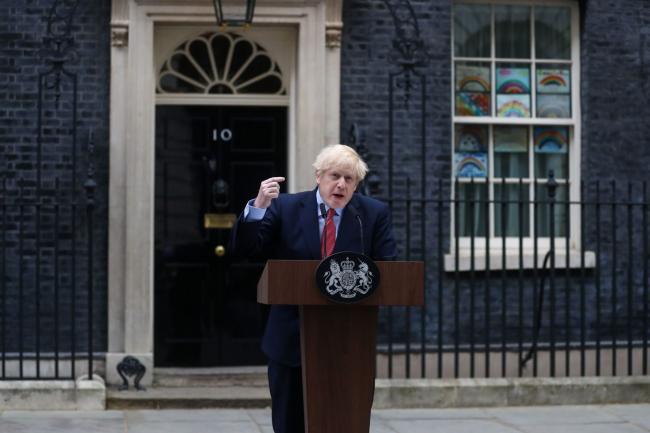This post was originally published on this site
https://d1-invdn-com.akamaized.net/content/pic0d37d7756689e8c3f189943931e5c4f6.jpg
Stressing there will be no immediate end to the lockdown, the British prime minister announced looser restrictions on movement from Wednesday, starting with unlimited outdoor leisure time for sports such as golf and tennis, and allowing people to drive to parks and beaches in England.
Johnson told people who cannot work at home — such as those in the manufacturing and construction sectors — to go to work. “Work from home if you can, but you should go to work if you can’t.”
But the premier also revealed plans to tighten the rules in key areas. Anyone flouting social distancing rules will face fines starting at 100 pounds ($124), an increase from 60 pounds. Fines will rise to a maximum of 3,200 pounds for repeat offenders.
“This is not the time simply to end the lockdown this week,” Johnson said in a televised address to the nation on Sunday evening. “Instead we are taking the first careful steps to modify our measures.”
The cautious approach will potentially further anger those members of Johnson’s Conservative Party who are pushing for a swift end to the lockdown that has so damaged Europe’s second-biggest economy. The government is caught between demands to get more people back to work and off the state’s furlough program, and the fear of triggering a new wave of infections that could require ministers to shut down the economy again.
‘Catastrophe’
In his address, Johnson said the country had avoided the “catastrophe” of the “reasonable worst case scenario” of 500,000 deaths from coronavirus because widespread adherence to lockdown rules had prevented hospitals from being overwhelmed. “It would be madness now to throw away that achievement by allowing a second spike,” he said.
The government plan includes:
Opposition politicians were quick to criticize the government’s new slogan emphasizing “stay alert” in place of “stay home.” The wording was unveiled on Sunday to try to strike a balance between urging people to go to work while still adhering to rules on staying two meters apart and avoiding unnecessary travel.
‘Vague’
Scottish First Minister Nicola Sturgeon called the messaging “vague and imprecise,” and said her administration would be sticking to its guidance for people to stay at home. “We are still at such a fragile stage in Scotland that the evidence shows it’s too soon to change our messaging,” she told reporters in Edinburgh.
The U.K. reported another 269 Covid-19 deaths on Sunday, bringing its total to 31,855, the most in Europe. That leaves Johnson with little room to maneuver as he charts a course out of the lockdown, especially after this government faced intense criticism over its response in the early days of the pandemic.
Researchers from Imperial College London, who are advising the government’s response, warned ministers last week deaths could top 100,000 if restrictions are eased too quickly, the Sunday Times newspaper reported.
On Sunday, Cambridge University statistician David Spiegelhalter criticized the government’s use of data in its daily press conference, calling it “number theater” that under reports cases and deaths. He estimated a minimum of 3.5 million people have contracted Covid-19, and said it’s “extraordinary” not enough testing has been done to provide an accurate picture.
Alert System
In his address, Johnson also unveiled a virus alert system, similar to how the government currently communicates terrorism threat levels. The five-level alerts range from one (green), which would enable life to return to normal, to five (red). The country is on the verge of improving from level four to three, he said, indicating that the infection rate isn’t increasing significantly.
Johnson said the government “must reverse rapidly the awful epidemics in care homes and in the NHS,” and said he would lay out further details of his roadmap to Parliament on Monday.
“Throughout this period of the next two months we will be driven not by mere hope or economic necessity. We are going to be driven by the science, the data and public health,” he said. “We have been through the initial peak — but it is coming down the mountain that is often more dangerous.”
©2020 Bloomberg L.P.

